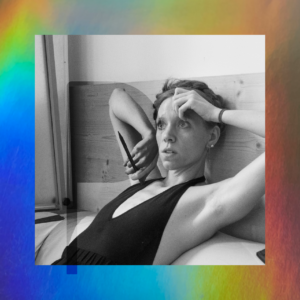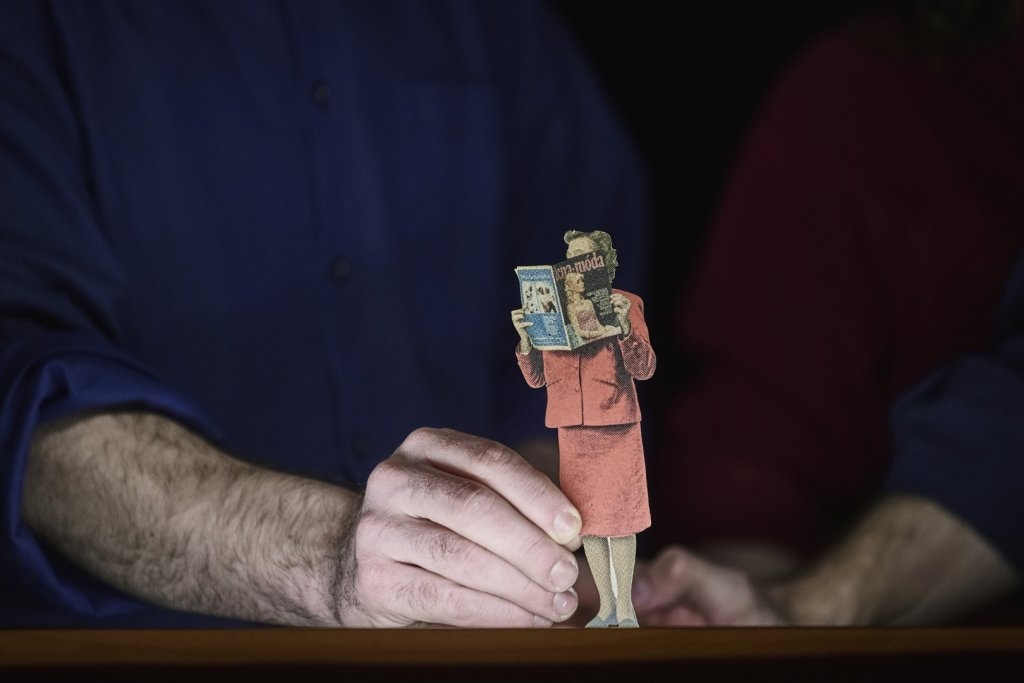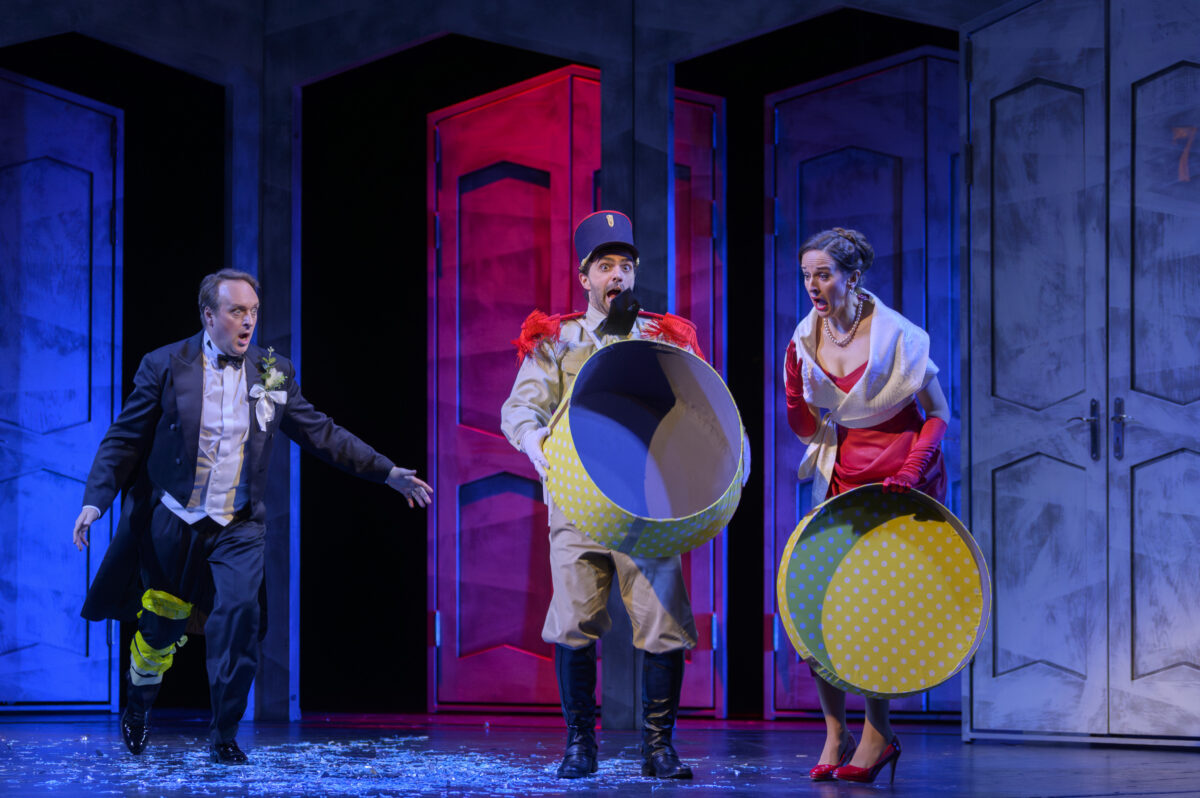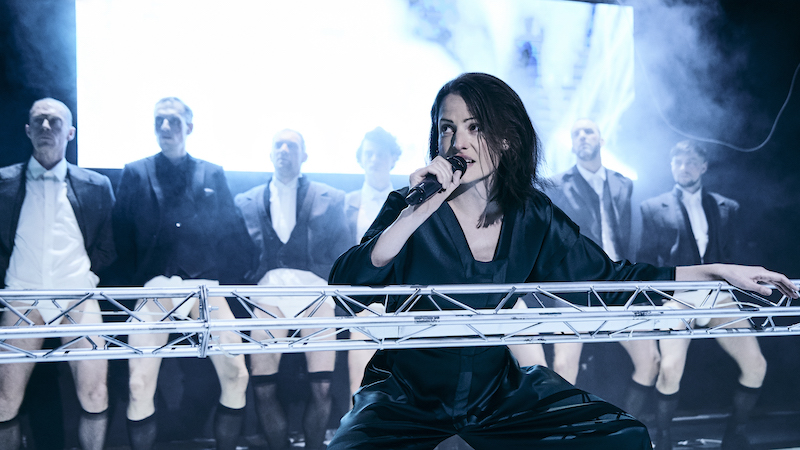
Interview by Josef Bartoš
A British-American performer living and working in Prague, Becka McFadden is an independent artist and the founder and artistic director of Beautiful Confusion Collective. In addition to leading Beautiful Confusion’s projects (Black Dress, HYPO, Vertigo Variations, the Movement/Architecture series of site-specific projects, etc.), she collaborates with other ensembles and artists, such as Depresivní dětí touží po penězích, Martin Talaga, PiNKBUS Platform, etc. and is a member of LegalAliens Theatre in London. In 2023, she received the prestigious Czech Thalia Award, awarded by the Actors’ Association, in the Alternative Theatre category. The expert jury commended her performance Black Dress[1] as follows: “On the aesthetic and dance side, the performance is precisely balanced, demonstrating ballet and contemporary elements at a technically virtuosic level. (…) The performer escapes the pitfalls of theatricality, is matter-of-fact and raw in movement. Throughout the performance she is communicative, relaxed and accepting, commenting on and naming the complexity of her existence – of her body, family and intellectual background, mindset and physical manifestation.”
You recently received the 2023 Thalia Award. Has this changed anything for you?
For me, the Thalia is a symbol of acceptance into the dance community here. It’s a reassurance that moving to Prague permanently was the right decision. This makes me very happy; it’s beautiful to feel accepted. Besides, every creative person doubts they’re good enough. But when you have something as physically tangible as a glass statuette, it does help you to realise that the constant questioning is only taking place in your head.
You wrote on your personal Facebook profile that you watched last year’s ceremony the night before the awards so you would have an idea of how the event would go and what type of speech to prepare. For many artists, the Thalia Award is the ultimate award. What does it feel like for you?
I really never expected that I would ever receive such a traditional award for the work I make. I very much appreciate it. At the same time, I understand it as a personal responsibility to continue. I feel that Prague offers many more opportunities for an artist like me. London, where I lived before, was much more conservative. Thanks to the Thalia, I have the sense that I don’t exist outside of the system here, which is very motivating.
Are you aware of the debate around the meaningfulness of the Thalia Award that comes up now and then?
No, I’m not. And while I appreciate it, at the same time, I think it is important that people don’t understand the Thalia Award as meaning something more than it actually does. Maybe it helps a particular artist to get more space for their work, but it’s not good to mistake it as some ultimate arbiter of artistic value. It would be sad if our success and artistic value were only defined by awards. For example, some artists that I consider truly exceptional have no awards. And it doesn’t mean that they are worse or better.
From what you’re saying, can we infer that awards are not that important to you?
They aren’t important to me. I haven’t received any other awards, and if I had to evaluate my success according to awards, that would mean that I was unsuccessful until the night I received this one. And I don’t feel that way. On the other hand, awards like these are a reason to celebrate, to look back at the work we’ve done and what we have achieved. Our field can often be quite lonely and isolating, if you don’t work in larger groups. We go from one grant deadline to the next, we’re always working… so stopping and realising what we’ve achieved is important.
You mentioned loneliness, the isolation of the work, of the creative process. Do you feel lonely?
Sometimes, yes. I work with a great team, which makes me very happy. Beautiful Confusion has existed since 2004. It’s come a long way since then and now I know that I can rely on my collaborators if I need to. But it’s still my “baby” and I have the sense that I have to take care of it. It’s me who has to come running if something goes wrong. And I don’t want to ask others for help because I don’t want to appear weak.
So perhaps it’s not just a sense of loneliness, but also a great sense of responsibility.
It’s a journey. It’s about being open to collaboration, making space for other “parents,” having some kind of safety net around me and learning that that’s not necessarily a bad thing.
You’ve been performing your production Black Dress for a year and a half. Has it changed during that time?
I think it has, yes. I’ve never performed anything else this long or this often. And the more I perform it, the more playful it becomes. There’s really a sense of looseness, of freedom. It’s not a linear transformation. It can depend on what context we’re performing in, or who’s in the audience.
In the show description, you write: “If I were to stand here in this dress and tell you that I don’t feel like a woman, would you believe me?” You’re speaking here about identity and gender; why are these issues important to you?
Gender and sexuality are issues I’m also dealing with in my personal life. It’s something that has been present in my life for a very long time, really since childhood. I started to process these thoughts more intensively during work on another project, when I started to read the work of Judith Butler. At that time, I wrote the history of my own sexuality, tried to figure out my own relationship to gender. There is this idea that nonbinary people are always androgynous-looking. The term nonbinary femme expresses the fact that it’s possible to be nonbinary, but still present as a woman. When I tell people that I don’t identify as a woman, one of the reactions I get is “but you look so feminine”.
The topic of identity and gender is a very current issue. I was intrigued that you have American citizenship, as well as British. What’s your view on the banning of drag queens at elementary schools in some American states? After all, it’s not just America, ultra-right parties are fighting “rainbow ideology” in Europe, too.
I take huge issue with this. It’s problematic how right-wing parties in the UK and the United States are strategically using queer and transgender people as political instruments. They stress that this community is dangerous, that it’s harming contemporary society, which is, of course, nonsense. This lets them appeal to a certain part of the electorate and direct attention away from how poorly they’re serving their citizens’ interests. It’s deeply upsetting.
As you mention, it’s not just the USA, but also similar political parties that we also encounter in Europe. We could mention in passing Italy, Hungary, Russia. And in the Czech Republic, for example, in addition to the proposal for a law establishing marriage equality, there is also a proposal to amend the constitution to include a definition of marriage as the union of a man and a woman. So it’s interesting that you’re making these points in a country that may be moving in a similar direction to America. And yet you feel freer…
I think that has a lot to do with the community of people I’ve met here. The whole group of people associated with Martin Talaga and PiNKBUS,[2] for example, or Nela Kornetová and her production Badman,[3] among many others. Queer in the original sense of the word includes everything that is not mainstream. Queer theory says that everyone can make their own path, which doesn’t necessarily look like what we’re used to, and that’s absolutely fine.
Still, the Czech Republic isn’t the most liberal country. We have the strong populist party ANO (the name refers to the activity of the civic association Akce nespokojených občanů, or Action of Dissatisfied Citizens), the relatively strong ultra-right party SPD (Svoboda a přímá demokracie, or Freedom and Direct Democracy), and also the organisation Aliance pro rodinu (Alliance for the Family), which organises a march in opposition to Prague Pride.
I have to admit that I was sad when the information about Black Dress in the 2023 Thalia Awards’ press pack made no mention of the queer content that is essential to the production. I felt that for a community of people who are constantly attacked and subjected to discrimination, it was an essential point that should not be overlooked. It’s good news for us, it’s something to celebrate. Which is why I mentioned it on stage, during the awards ceremony.
Do you think it was intentional?
I don’t know. But we did not write the version of the text that appeared in those materials.
One can’t help but notice that your work is dominated by social themes.
Yes, that’s true. I have a doctorate in the sociology of theatre. When I was little, I wanted to be a lawyer; I was interested in human rights and social issues. I always say that I make a performance when I need to figure something out. I have to do it physically, though, with my body. If a particular issue doesn’t bother me, if it doesn’t create some kind of tension in me, there’s no performance to make. It’s logical that a person’s art will be more powerful if they have a personal relationship to it.
An abridged and edited version of an interview published on 26 October 2023 on Taneční aktuality / Dance Context, an online portal focusing on dance.
[1] Black Dress, concept: Becka McFadden, choreography and direction: Becka McFadden, Daniel Somerville, Beautiful Confusion Collective, premiere 2.5.2022, Venuše ve Švehlovce, Prague.
[2] PiNKBUS is a queer arts platform, producing cabaret-style events featuring performances by drag queens, burlesque performers and other queer artists. The first performance took place in Prague at Venuše ve Švehlovce in 2020.
[3] Badman, concept and direction: Nela Kornetová, T.I.T.S., premiere 7.2.2020, Grenland Friteater, Porsgrunn.
categories
Interdisciplinary / Interview

 Learn
Learn






